It seems like only yesterday that the Faculty welcomed the students with a busy month of September, complete with five major conferences and a breakfast event with Dean Daniel Jutras.
This month of March featured a similarly packed calendar, including a visit from four local high schools as well as an impressive number of student-initiated events, from Human Rights Month to networking events to a vigil on Parliament Hill.
The array of events in March marked the apex of and bookend to a busy winter term and as students head into exams and look towards Convocation, Focus online provides a glimpse at how the vibrant intellectual life of the Faculty wrapped up the school year.
Community Captured
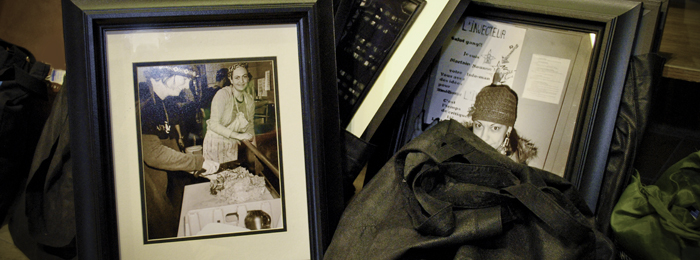
In an effort to challenge stereotypes of unrepresented and under-represented groups, Community Law McGill distributed 50 disposable cameras to people receiving services all over the city of Montreal and encouraged them to capture their notion of “community” on film.
In conjunction with students at the School of Social Work and the Faculty of Education, Tanya De Mello, of Community Law and Pro Bono McGill, curated a selection of photos and displayed them in an exhibition at the Faculty of Education.
The March reception for the exhibition featured images of people, iconic places and everyday interactions, all stylistically displayed in frames and on the walls of the atrium and a few of the photographers themselves also took part, sharing stories about what their photos depicted and how their images related to social justice in their communities.
Human Rights Month
Under the banner of Human Rights Month, the Human Rights Working Group hosted a series of lectures, workshops and film screenings throughout the month of March, in conjunction with groups around the Faculty such as Hillel Montreal, the Centre for Law and Aging, the McGill Journal for Law and Health and the Disability and the Law student group.
The expansive calendar included a panel discussion about legal, clinical and ethical aspects of mental capacity, film screenings of documentaries about the Nuremberg Trial and about the Special Court of Sierra Leone, as well as a presentation about the campaign to end crimes against future generations.
Vigil for missing and murdered Aboriginal women
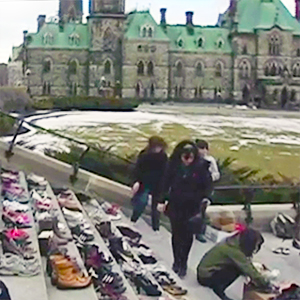
Also part of Human Rights Month was a two-week campaign co-organized by the Aboriginal Law Students’ Association to raise awareness about missing and murdered Aboriginal women in Canada. Students, faculty and friends collected almost 500 pairs of women’s shoes during the first two weeks of March, which they then transported to Ottawa to place on Parliament Hill.
Organizer Tiffany Boisvert explains that many passersby stopped to ask, “Why the shoes?” to which she would reply, “The shoes are a representation of the the number of missing and murdered Aboriginal Women in Canada.”
“Sometimes a conversation would follow around the subject of the violence and injustice suffered disproportionately by this community, due to a variety of factors, including systemic discrimination, and inadequate government services,” Boisvert said, adding that the vigil also “put students in touch with grassroots activists, and gave us an opportunity to engage in a hands-on way with the movement, which I feel is critical to understanding and promoting the cause effectively.”
Carlos Fuentes
By Tamarah Feder, McGill Reporter
Mexico’s prolific and internationally renowned author Carlos Fuentes was the keynote speaker at the McGill Law Journal annual conference on March 28. Fuentes, as gracious as he is humourous, recounted to students, faculty and public how his experiences studying law influenced his perception of the world and, ultimately, his writing. A lively question and answer period followed in which audience members expressed their heartfelt appreciation for the author’s contributions to literature and society, and solicited his thoughts on a range of subjects including contemporary challenges in Mexico, the global Spanish-speaking community, and the discipline necessary for writing.
High School Outreach
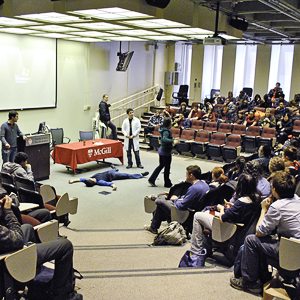
High school students from four local schools – École secondaire Pierre-Dupuy, Lasalle Community Comprehensive High School, James Lyng High School and Kahnawake Survival School – spent a day at the Faculty touring the campus and taking part in a mystery mock trial.
A scene of chaos preceded the trial itself, as Dean Blachford, the coordinator of the outreach program, took a bite of an apple and promptly choked on it as another student threatened him with a fencing épée. A hapless doctor (played by another student) tried ineffectively to step in, but not before Dean fell to the ground, dead. Who should be found guilty for Dean’s death? the facilitators asked the high school students.
The fully bilingual trial took place in the Moot Court, and representatives from each school took turns presenting their arguments accusing and defending both the fencer and the doctor. Some students stated their cases and quickly sat back down while others offered spirited arguments for their clients.
After a tense moment during which the students were polled for their vote on the verdict, the trial ended with a hung jury and the students headed over to McGill’s athletic facilities to finish the afternoon with a swim and game of basketball.
Alumni Cocktail, Black Law Students Association of McGill
The Black Law Students Association (BLSA) of McGill hosted an alumni cocktail in the Faculty’s Common Room on March 16, during which students gathered to hear Law gradutes Laurent Koné, Alexandre Bien-Aimé, Jean-François Gascon and Gassim Bangoura speak about their career paths and share their personal experiences.
Said BLSA McGill President Simone Samuels, “Attendees sat in a circle on the couches of the Common Room in Old Chancellor Day Hall and munched on samosas and cookies as alumni fielded questions about alternative career paths in law and outside of law, mentorship, establishing a possible scholarship and other ways that the BLSA alumni network could grow and become effective. Everyone in attendance left feeling like they had learned something and that they were part of something cohesive, innovative and full of potential.”
Also this spring, two McGill representatives of the BLSA were elected to the national executive: Ashley Adams was elected to the position of treasurer and Samuels was elected to the position of national mentorship representative. “Five out of 10 members of the executive this year will be from Quebec,” Samuels notes, adding that this also means “there is a bilingual focus to all our programming, including next year’s national conference.”
Student Donor reception
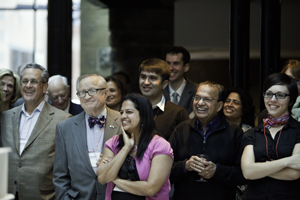
Seventy students and friends of the Faculty gathered in mid-March to celebrate the student achievements made possible by generous donors who contributed to privately-funded student awards. The reception gave students and donors the opportunity to meet each other and to learn about the goals of the awards as well as their outcomes.
Patrick Reynaud received an entrance scholarship in Law and at the reception met James and Katherine Robb and Melvin and Joan Rothman, who established the scholarship. Isaac Langleben received awards in corporate and commercial law and in real estate and met the donors, Robert Yalden (for Osler, Hoskin and Harcourt) and Fredric Carsley and Virginia Lam (for De Grandpré Chait). Pascale Cornut St-Pierre and Anja Koortenaar received leadership awards and were introduced to Graham Nesbitt, who represented McCarthy Tétrault.
Marc Barbeau, BCL/LLB ’84, (see our April Cover story) told guests about his adventures during an academic year spent abroad in France, in a story that featured such props as his student and library card as well as a downhill ski. Other speakers included Chiara Fish, who spent a summer in Iqaluit doing legal research for Maliiganik Tukisiiniakvik Legal Services courtesy of the Novak-Weil Human rights Internship Award, and Tanya de Mello (see Community Captured, above), who received the David Litner , Q.C. Scholarship, in recognition of her contributions to the life of the Faculty.
Women’s Caucus
By Joannie Jacob
During Reading Week, about 16 female law students from all years used their free-time to go discover our national capital and see what it has to teach us about the law. This trip was organized for the first time this year by the Women’s Caucus and was a great success. It is my hope that it will continue to grow in future years, adding more activities and getting more students to participate.
The activities the participants could choose from included: attending to trials at the Supreme Court on both mornings, a guided tour of the Supreme Court and a meeting with Justice Rosalie Abella, a meeting with the Conflict of Interest and Ethics Commissioner Mary Dawson, and a cocktail at Sack Goldblatt Mitchell LL.
If you are interested in getting involved with the Women’s Caucus and hearing about our activities, drop us a line at law.womenscaucus@gmail.com.
Federal Court Hearing
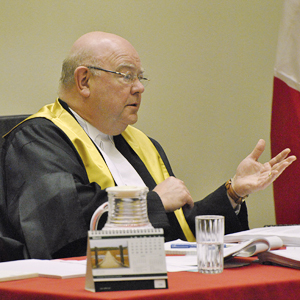
To give students an opportunity to see a Federal Court hearing in person, the Honourable Sean J. Harrington BCL’68 presided over an immigration hearing in the Faculty’s Moot Court in early March.
The case, an application for leave and judicial review, concerned the Immigration and Refugee Board’s finding that the applicants, two Muslim men from Pakistan — one of whom had been accused of being gay — did not meet the criteria for refugee status.
Following the hearing, Justice Harrington and counsel for both parties answered students’ questions, which ranged from how to argue before the Federal Court to the viability of other arguments in the case, including issues of religion and homophobia.
